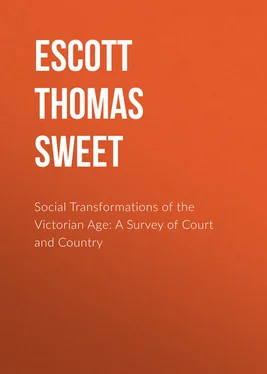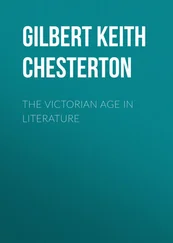The Princes and Princesses who once rode their ponies between Albert and Stanhope Gates are now bearing a part in the government of Empires, but are seldom for long unrepresented in the moving and glittering throng. The ‘city’ in the Row is not a novelty. The Church began with Archbishop Tait to be more prominently represented than was ever known before. The most emancipated of bygone occupants of Lambeth would scarcely have looked forward to the time when a cavalcade composed of archiepiscopal children, led by a Primate himself in the van, with his Chaplain bringing up the rear, would canter to and fro along the Row. Hyde Park is not to-day visited by early water drinkers who believe in the virtues of the probably forgotten spring in Kensington Gardens hard by. But not many hours after dawn, the novelty, as to early Victorian observers it would have seemed, may be witnessed of ladies and gentlemen issuing in bands from their Tyburnian or Kensingtonian homes to gain an appetite for breakfast, and a store of fresh air for the day’s confinement, by making at least once the circuit of the Park while the roads are at their emptiest, and the dewdrops still glisten on the flowers.
Something else than the extended popularity of London’s most serviceable ‘lung’ is suggested by the contrast between Hyde Park as it is now, and as it was three or four decades since. The dandies are not the only feature in the social landscape one looks for in vain. The commanding personalities of individuals of either sex which seemed common on every social plane thirty or forty years since have largely disappeared now. The levelling influences of a democratic epoch have reduced to a uniformity of unheroic proportions those who represent in our public places the interests, the occupations, the achievements, or the society of their day. It is called a prosaic age. It is certainly, as compared with its predecessors, a lilliputian one. At the very zenith of his power, Mr Gladstone in the streets or parks of London, never fixed the attention of the crowd to the same degree as his political master, the great Sir Robert Peel. The adroit, accomplished, and singularly successful soldier, who, since the Duke of Cambridge’s retirement, has been Commander-in-Chief, resembles the Duke of Wellington in stature. Neither Lord Wolseley, nor any of his contemporaries, compels as yet from street crowds the mute veneration and awe which the simple fact of his unrivalled pre-eminence as a subject secured for the Duke of Wellington whenever he set foot in Piccadilly, or turned his horse’s head in the direction of the Horse Guards down Constitution Hill.
Outside the Royal Family there is no great lady who like an earlier Lady Jersey is greeted as a queen by crowds to which she can only be a name. In the same way, the average of efficiency in journalism was never so high as at present, nor the editing as well as the writing and compiling of newspapers ever more competently performed. The editor, however, of the stamp of John Thaddeus Delane does not, nor by the circumstances of the time could, any longer exist. The responsible head of a great newspaper office has necessarily become less a creator of public opinion, less even of an interpreter, which Delane signally was, of middle class English thought, than the custodian of a commercial interest, the vicegerent of a proprietor who regards the journal, first, as a great organ of public opinion; secondly, as the instrument for achieving his own patriotic purposes in his own way. While Delane was yet living, the able conductor of another great daily journal was ambitious to fill a place like Delane’s in the social and political system. It was a sad mistake. In journalism, more than anywhere else, as this gentleman ought to have known, given the requisite capacity which he undoubtedly had, a man may exercise almost any power he likes on condition that he himself remains in the background, and neither in jest nor earnest magnifies his apostleship too much. The consequence was, in the particular case now spoken of, that after some years of patient forbearance on the owner’s part, his solicitor waited on the editor one fine morning at his country house, and curtly handed the gentleman, who thought himself indispensable, a formal note of dismissal. Stories were told of occasional collision even between Mr Delane and the proprietary of the great newspaper. These were for the most part doubtless apocryphal. The one thing which observers knew for certain was that when the commercial master of the newspaper appeared during the evening in the same room as its literary controller, Mr Delane generally found that he had an engagement at his office. Some years after the date at which Hyde Park retrospectively has been presented, the best, if not the only, well known man of letters to be observed on horseback was A. W. Kinglake, the historian of the Crimean war. When he passed away there was left stout-hearted, short-tempered Anthony Trollope, who, up to the time of his fatal seizure, pounded his sturdy cob so many times round the enclosure between Cumberland and Albert Gates, just as a few hours earlier in his study, whether in or out of the vein, he had completed a fixed number of words of his new novel. These knights of the pen are followed (1897) by Frederic Harrison, Leslie Stephen and W. S. Lilly. The last quarter of a century in London finds us with many adequate representatives of national industry and achievement. The hero who in any department sums up the exploits and the tendencies of his age will with difficulty be found. The fact that it is the day of great successes does not prevent its being comparatively the age of small men. So long as the veteran Lord Tollemache, of Peckforton, survived to drive his team in its harness of untanned leather from Marlborough Gate to Portman Square, the peerage in its social aspect did not lack one whom Carlyle would have admitted to be in his way a hero. Since 1890, when Lord Tollemache died, Burke and Debrett contain no name whose owner is the cynosure of the holiday crowd in at all the same degree as that last survivor of those noblemen whose figures at an earlier period of this reign were as well known to the popular eye as their position or eccentricity was celebrated in popular talk.
CHAPTER II
THE NEW WEALTH
Commercial plutocracy not seen in England for the first time under Queen Victoria, but dates from Queen Elizabeth or earlier. Wealth, birth, intellect, often united in England. City traders being Lord Mayors who from 1452 onwards have founded noble houses. The chief elements in the new nineteenth century wealth considered. Gold discoveries in California 1848, in Australia 1850. Their transforming influences at home and abroad. Expert opinions of the period on the consequences and the durability of the new gold. Different views and calculations of Sir Archibald Alison, Sir Roderick Murchison, Chevalier and Cobden. A new civilization resting on gold. Australian millionaire farmers preceded millionaire gold diggers. Effects of new gold upon circulating and fixed wealth of England tested by property assessments.
‘I respect the aristocracy of birth and of intellect. I do not respect the aristocracy of wealth.’ The remark is attributed to the great, or second, Sir Robert Peel. It proceeds upon a confused view of the social principles indicated by the words. It comes, somewhat inappropriately, from the political successor of the William Pitt who bestowed more peerages upon the possessors of mere wealth than any Minister before his time had done. The distinction drawn by Sir Robert Peel between the different aristocracies of England involves some misconceptions of social history. In Austria there existed during the last century, there perhaps survives faintly to this day, an antagonism between the principles of birth and of wealth such as England has never known. With more than conventional fitness is the Premier of the day, whether peer or commoner, the guest on each 9th of November of the First Magistrate of London City. Within five centuries, at least fourteen noble houses have been founded by ten Lord Mayors.
Читать дальше












